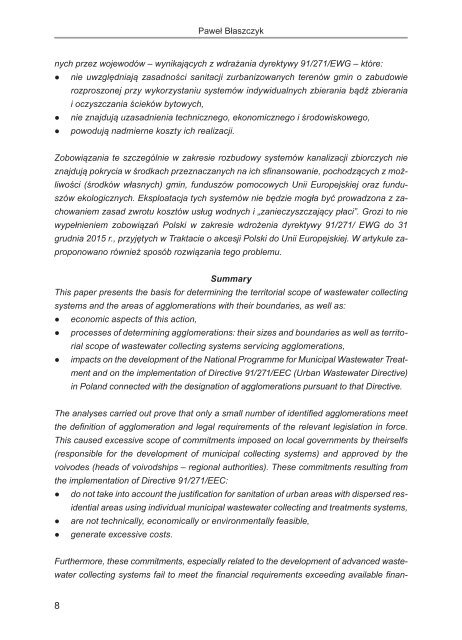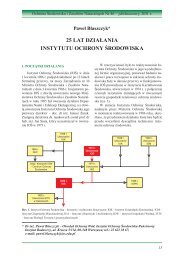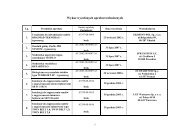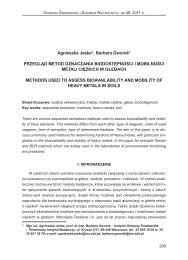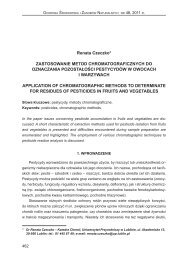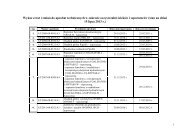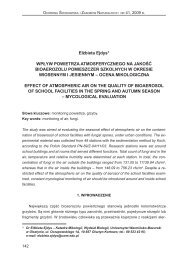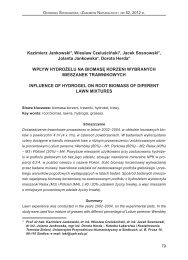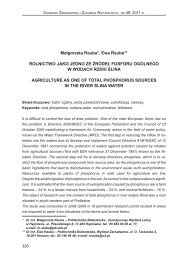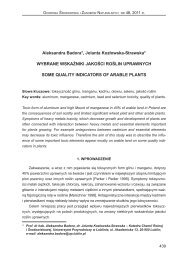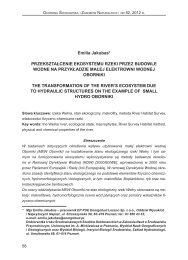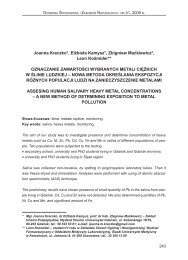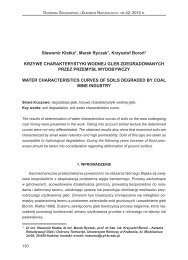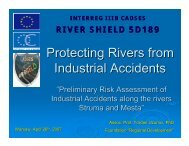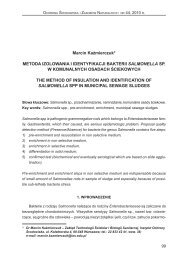wpÅyw wyznaczania granic i obszarów aglomeracji oraz zasiÄgu ...
wpÅyw wyznaczania granic i obszarów aglomeracji oraz zasiÄgu ...
wpÅyw wyznaczania granic i obszarów aglomeracji oraz zasiÄgu ...
You also want an ePaper? Increase the reach of your titles
YUMPU automatically turns print PDFs into web optimized ePapers that Google loves.
Paweł Błaszczyk<br />
nych przez wojewodów – wynikających z wdrażania dyrektywy 91/271/EWG – które:<br />
● nie uwzględniają zasadności sanitacji zurbanizowanych terenów gmin o zabudowie<br />
rozproszonej przy wykorzystaniu systemów indywidualnych zbierania bądź zbierania<br />
i oczyszczania ścieków bytowych,<br />
● nie znajdują uzasadnienia technicznego, ekonomicznego i środowiskowego,<br />
● powodują nadmierne koszty ich realizacji.<br />
Zobowiązania te szczególnie w zakresie rozbudowy systemów kanalizacji zbiorczych nie<br />
znajdują pokrycia w środkach przeznaczanych na ich sfinansowanie, pochodzących z możliwości<br />
(środków własnych) gmin, funduszów pomocowych Unii Europejskiej <strong>oraz</strong> funduszów<br />
ekologicznych. Eksploatacja tych systemów nie będzie mogła być prowadzona z zachowaniem<br />
zasad zwrotu kosztów usług wodnych i „zanieczyszczający płaci”. Grozi to nie<br />
wypełnieniem zobowiązań Polski w zakresie wdrożenia dyrektywy 91/271/ EWG do 31<br />
grudnia 2015 r., przyjętych w Traktacie o akcesji Polski do Unii Europejskiej. W artykule zaproponowano<br />
również sposób rozwiązania tego problemu.<br />
Summary<br />
This paper presents the basis for determining the territorial scope of wastewater collecting<br />
systems and the areas of agglomerations with their boundaries, as well as:<br />
● economic aspects of this action,<br />
● processes of determining agglomerations: their sizes and boundaries as well as territorial<br />
scope of wastewater collecting systems servicing agglomerations,<br />
● impacts on the development of the National Programme for Municipal Wastewater Treatment<br />
and on the implementation of Directive 91/271/EEC (Urban Wastewater Directive)<br />
in Poland connected with the designation of agglomerations pursuant to that Directive.<br />
The analyses carried out prove that only a small number of identified agglomerations meet<br />
the definition of agglomeration and legal requirements of the relevant legislation in force.<br />
This caused excessive scope of commitments imposed on local governments by theirselfs<br />
(responsible for the development of municipal collecting systems) and approved by the<br />
voivodes (heads of voivodships – regional authorities). These commitments resulting from<br />
the implementation of Directive 91/271/EEC:<br />
● do not take into account the justification for sanitation of urban areas with dispersed residential<br />
areas using individual municipal wastewater collecting and treatments systems,<br />
● are not technically, economically or environmentally feasible,<br />
● generate excessive costs.<br />
Furthermore, these commitments, especially related to the development of advanced wastewater<br />
collecting systems fail to meet the financial requirements exceeding available finan-<br />
8


